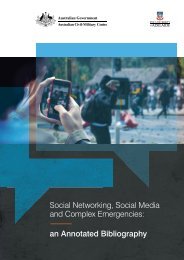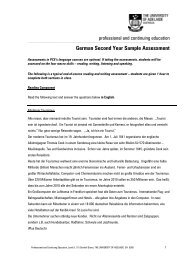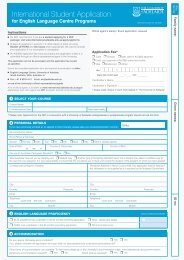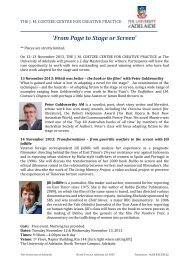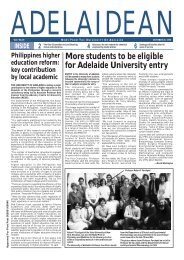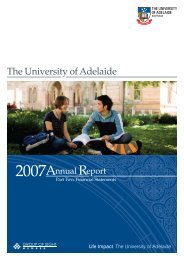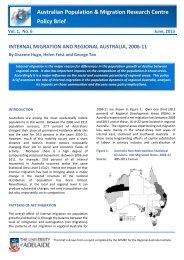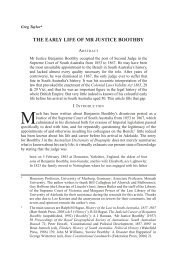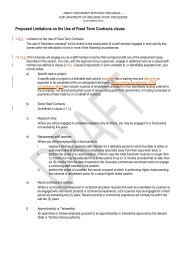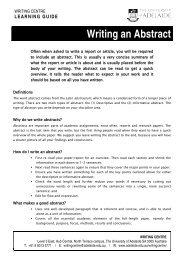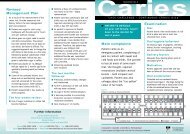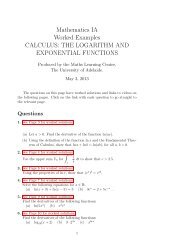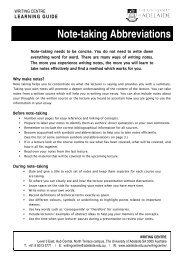Unbridling the Tongues of Women - The University of Adelaide
Unbridling the Tongues of Women - The University of Adelaide
Unbridling the Tongues of Women - The University of Adelaide
Create successful ePaper yourself
Turn your PDF publications into a flip-book with our unique Google optimized e-Paper software.
Learning for <strong>the</strong> future<br />
cause <strong>the</strong>y taught ‘things that make for human happiness and intellectual freedom’,<br />
‘lessons on <strong>the</strong> right relations <strong>of</strong> human beings to each o<strong>the</strong>r’. 13 From that conversation<br />
Spence derived an increased concern that education should explain ordinary,<br />
every-day practicalities.<br />
Later, back in South Australia, she was provoked to public statement by <strong>the</strong><br />
question <strong>of</strong> <strong>the</strong> content <strong>of</strong> elementary education. In Britain, a liberal government<br />
passed a first measure for universal elementary schooling in 1870. In South Australia,<br />
dispute over education raged from 1872 until a royal commission on education<br />
reported in 1882. In 1873, discontent among <strong>the</strong> colonists sharpened in response<br />
to reports <strong>of</strong> <strong>the</strong> implementation <strong>of</strong> <strong>the</strong> 1872 Education Act in <strong>the</strong> neighbouring<br />
colony, Victoria, which provided generally free, compulsory and secular schooling. 14<br />
When <strong>the</strong> South Australian parliament met in July 1873, <strong>the</strong> government promised<br />
to bring in a bill which would make use <strong>of</strong> ‘<strong>the</strong> experience gained from <strong>the</strong> working<br />
<strong>of</strong> <strong>the</strong> new Education Act in Victoria’. But <strong>the</strong> South Australian bill was first<br />
amended beyond recognition in <strong>the</strong> House <strong>of</strong> Assembly, <strong>the</strong>n in December, thrown<br />
out by <strong>the</strong> Legislative Council. 15 Dispute centred on continued bible reading and<br />
government provision <strong>of</strong> fees for all, or only destitute, children. Divided opinion<br />
inside <strong>the</strong> parliament was a pale reflection <strong>of</strong> that outside. In <strong>the</strong> advertisements,<br />
articles and letters in <strong>the</strong> press, at <strong>the</strong> meetings held in local schoolrooms and <strong>the</strong><br />
<strong>Adelaide</strong> Town Hall, practical determination <strong>of</strong> <strong>the</strong> content <strong>of</strong> <strong>the</strong> education to be<br />
imparted was lost from sight. 16 Despite defeat in parliament, <strong>the</strong> government probably<br />
retained some hope for improvements within <strong>the</strong> existing system. At <strong>the</strong> beginning<br />
<strong>of</strong> 1874 its negotiations with <strong>the</strong> old Education Board, initially appointed in<br />
1851, resulted in <strong>the</strong> Board’s resignation. <strong>The</strong> government appointed a new board,<br />
and made John Anderson Hartley its chairman. Hartley, <strong>the</strong> headmaster <strong>of</strong> <strong>the</strong> private,<br />
denominational boys’ school, Prince Alfred College, had been a member <strong>of</strong> <strong>the</strong><br />
old Board since 1871, but his attempts to increase pr<strong>of</strong>essionalism throughout <strong>the</strong><br />
education system had been unsuccessful. As chairman <strong>of</strong> <strong>the</strong> new board he won his<br />
colleagues’ support for a policy <strong>of</strong> sweeping change. 17 One <strong>of</strong> his first moves was to<br />
draw up new examinations for teachers requesting certificates which entitled <strong>the</strong>m to<br />
government grants. <strong>The</strong>n, in July 1874, he published <strong>the</strong> first results from <strong>the</strong> new<br />
examinations. <strong>The</strong> account which appeared in <strong>the</strong> daily press presented <strong>the</strong> teachers<br />
for general mockery and derision. 18<br />
Spence was furious. In <strong>the</strong> first place, she protested, <strong>the</strong> teachers were ‘inadequately<br />
prepared’: ‘<strong>The</strong> promised list <strong>of</strong> books recommended for teachers to prepare<br />
97



